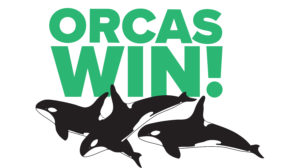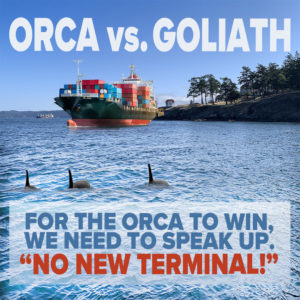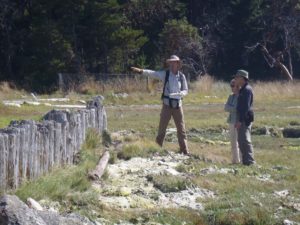As we reach the end of 2021, there is a lot to celebrate, and we could not have achieved so much without you. Please enjoy this look back at the highlights of what your support has helped us accomplish in 2021.
Salish Sea Vessel Traffic Projections

We recently released an update to our Salish Sea Vessel Traffic Projections, these projections document 22 new or expanding terminal and refinery projects that have been proposed, permitted, or recently completed and which would add at least 2,634 annual vessel transits to and from Salish Sea ports in British Columbia and Washington State. If all of these terminal and refinery projects are permitted and developed, the result would be at least a 25 percent increase in large, ocean-going commercial vessel traffic, as compared with vessel traffic in 2020. Eight of the 22 projects also include increases to both ocean-going and Salish Sea-only vessel traffic. What is significant is that none of the new, expansion, or redevelopment projects in Washington state quantify any increases in ocean-going vessel traffic. For more information: https://sanjuans.org/ssvtp/
Phillips 66 Refinery’s Appeal to the Court of Appeals

In April of 2021, Whatcom County Superior Court Judge David Freeman delivered a court victory to Friends of the San Juans and the endangered Southern Resident killer whales. The decision will help hold a Phillips 66 refinery expansion accountable for the proposed project’s potential impacts to the Southern Residents. However, on May 3, 2021, Phillips 66 filed an appeal with the Washington State Court of Appeals, Division One, with Whatcom County and Friends of the San Juans listed as defendants. Earthjustice is representing Friends in this appeal.

Permit and Enforcement Monitoring
As always, Friends closely monitored everything from new construction permits in our county to port and refinery-expansion permit applications across the Salish Sea this year. Friends ensures that laws and environmental protections are being followed and enforced, in a fair and equitable way — including legal action when absolutely necessary to protect what we all love about these islands, the Salish Sea, and our way of life.
Salmon Point Beach Restoration

At the south end of Lopez Island, two areas of failed rock armoring and fill were covering portions of a documented surf smelt spawning beach, negatively impacting the habitat available for forage fish to lay their eggs on. The beach is also in a priority area for out-migrating juvenile salmon, which feed on forage fish along with many other critters such as insects that benefit from a natural shoreline. Our endangered orca, of course, rely on healthy salmon populations. In September, Friends removed 42 cubic yards of medium to large boulders along with four large toxic creosote logs from this beach. With the help from the Island Conservation Corps. we also planted native plants for natural bank stabilization.
Marine Riparian Restoration

In late 2020 and early 2021, Friends completed multiple shoreline vegetation enhancement projects with private waterfront property owners in priority salmon recovery regions. A total of 49 trees, 1,510 shrubs, and 400 willow stakes were planted in these degraded riparian buffer areas. 735 dune grasses were planted on the upper beach/backshore across the four sites. These actions restored native marine riparian vegetation along 750 linear waterfront feet of marine shoreline providing bank stabilization, insects for juvenile salmon, and shade for forage fish eggs.
Sucia Beach and Salt Marsh Restoration

In the fall of 2020, we completed a restoration project at Sucia Island’s Mud Bay that reconnected a salt marsh to the bay and removed tons of armoring, rock, and fill off a forage fish spawning beach. Our actions restored juvenile salmon and forage fish habitat – improving the food web for Southern Resident Killer Whales!
In 2021, to help educate the community about this work, we installed two beautiful and informative restoration interpretive panels designed by Larry Eifert. We also released a video highlighting this project, and you can view it here: Sucia Project Video
Our science team has also been regularly monitoring the beach and the marsh; this includes conducting physical and visual monitoring, fish surveys in the marsh channels, and forage fish egg beach surveys. We’ve witnessed fish in the farthest reaches of the restored salt marsh, which indicates that the marsh ecosystem is recovering and getting stronger by the day.
Expert Site Visits and Restoration Designs

Friends of the San Juans has been developing several shoreline habitat enhancement projects this year. With coastal geology experts, we met many property owners to explore potential new restoration projects. For sites that do not need restoration, we also provide guidance on how to address such concerns as drainage issues and vegetation management to reduce erosion and improve habitat. In every project, we’re partnering with landowners, government agencies, other organizations, local contractors, and volunteers to help improve our county’s shorelines for the forage fish, for the salmon, for the orca, and more.
Shoreline Restoration Website

For almost 20 years, Friends of the San Juans has been identifying, developing, and implementing shoreline projects to help restore habitats and marine food webs. This year we launched a new Shoreline Restoration website that will tell you more about all these projects: https://sanjuans.org/shoreline_restoration/

The Search for Forage Fish Eggs Continues
In 2021, our efforts to document Pacific sand lance and surf smelt spawning beaches continued. With assistance from 59 volunteers over the last three years, 20 previously unknown forage fish spawning beaches are now documented and afforded additional protections.
Student Mentoring Program Expands

This year at Friends we have expanded our work with high-school students and are now growing our environmental mentoring program to include students on both San Juan and Orcas Island. Our Youth for Change program provides an opportunity for young people to share ideas, learn about environmental challenges in our community, engage in local stewardship projects, work together with peers in implementing action projects, and earn a $200 stipend for their time and effort.
Immersive Salish Sea Education Program

Friends has also developed and implemented a program that teaches students about marine food webs using 360-degree film footage and virtual reality technology. Local students use virtual reality headsets to dive underwater with the salmon and herring while learning about protecting our marine wildlife and seeing scientists in action. You can view the video in YouTube but read the instructions to be sure you see all 360 degrees of the film. Shorelines and Salmon 360/VR Video
Comprehensive Plan Update

Friends of the San Juans has been and will continue to be heavily involved in San Juan County’s Comprehensive Plan Update process, ensuring environmental stewardship and climate action are front and center as our county plans and sets the rules for how it will grow over the next 10–20 years. We’ve created a Comp Plan Action Team of concerned community members like you, to help build and show public support. For example, through this process, Friends is leading the effort to protect our County’s few remaining Agricultural and Forest Resource Lands from development.
Gratitude

All these actions and much more, could not have been possible without our supporters. We are incredibly grateful our incredibly supportive members; we can’t achieve our goals without you! We also want to recognize the following state, federal, and private foundation funders: The Burning Foundation, The Campbell Foundation, The Harder Foundation, The Horizons Foundation, Keta Legacy Foundation, The Lummi Nation, The Madrona Institute, National Fish and Wildlife Foundation, Northwest Fund for the Environment, Orcas Island Community Foundation, Puget Sound Partnership, Stand Up to Oil, U.S. Environmental Protection Agency, US Fish & Wildlife Service, WA State Salmon Recovery Funding Board, WA State Estuary and Salmon Restoration Program, WA Dept of Fish & Wildlife – ALEA program, the Tulalip Tribes, and The Wheeler Foundation.
